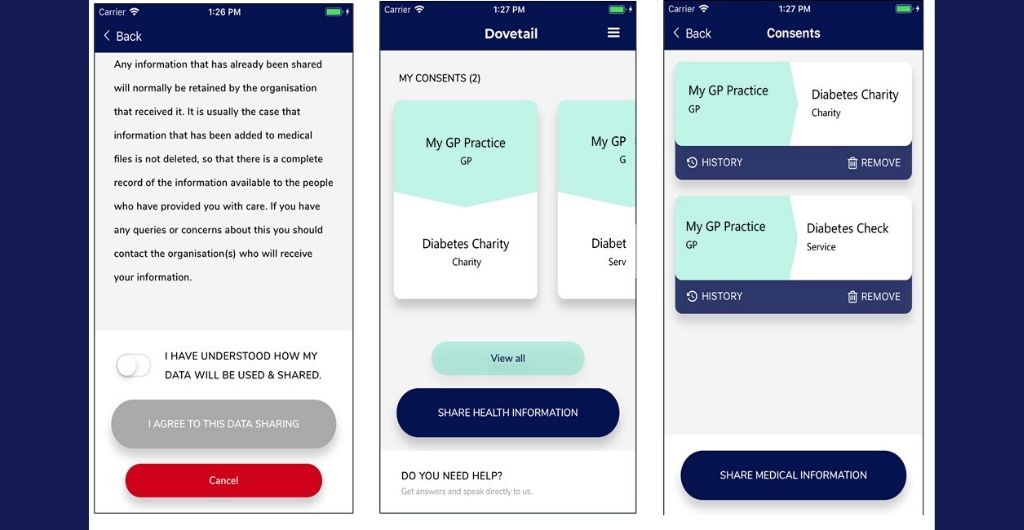
A group of patients with diabetes were surveyed on their understanding of the consent process to have their medical data shared with digital platforms offering innovations to the management of their condition.
The current ability to share patient data between different practices, who each specialise in different aspects of the patients care, is a long process.
However, the Dovetail digital consent application uses a mobile application and blockchain infrastructure to offer an IT technology, which facilitate sharing patient data and offer them the right to revoke consent.
Patients found the Dovetail digital consent favourable, as they were empowered to manage their condition within an integrated care setting, whilst maintaining control over sharing of their data.
Patients with diabetes often must see many different stakeholders who each specialise in different aspects of their treatment. Researchers from WMG, University of Warwick surveyed patients on their understanding of how their data was shared and found they would prefer to have it shared digitally using the Dovetail Digital consent application.
There are 4.7 million people in the UK live with diabetes and will spend a lot of time visiting different specialists in different practices, who each specialise in some aspect of their treatment. Furthermore, advances in digital technologies have resulted in innovative applications, which supported by healthcare professionals enable self-management, empowering patients to take control over aspects of their care. This requires a lot of data sharing which is currently done by one practice requesting the medical records off another practice; with the need for doctors’ consent to share, this can be a long process to sign off. Furthermore, the process tends to be obscure with the patients forgetting the transfers for which they have given consent, as well not being very easy to revoke consent should they want so. The ability of patients to have control is one of the fundamental ethical and legal rights of the patient, and in many cases is difficult to balance against beneficial data sharing intensive applications.
However, researchers from the Institute of Digital Healthcare (IDH) at WMG, University of Warwick propose that a new system called the Dovetail Digital consent application is favourable and have analysed it in the paper; “Evaluation of patient perception towards dynamic health data sharing using blockchain based digital consent with the Dovetail digital consent application: A cross sectional exploratory study, published in the journal Digital Health, SAGE Publications.”
The Dovetail digital consent application is a robust, trusted and flexible mechanism for patients to offer their consent for their data to be shared between GP practices; they can also revoke consent at any point, therefore empowering them to manage their condition within an integrated care setting.
Dovetail sees a mobile application and blockchain-based infrastructure, meaning they can trace where their data has been shared. Blockchain is a state-of-the art technology originating in the financial industry, which has allowed implementing healthcare applications with the confidence and robustness found in the financial sector.
To survey whether it would work, IDH researchers asked 23 patients and 13 staff with diabetes, at a GP practice, to complete a series of questionnaires, followed by a focus group discussion, to determine their understanding of current methods to share data in a medical setting, and to see if they recall giving consent.
IDH Researchers then conducted a thematic analysis of the focus group transcripts and descriptive statistics of the questionnaires were performed.
Professor Theo Arvanitis, Director of the Institute of Digital Healthcare at WMG, University of Warwick explains what they found:
“We discovered there was a lack of understanding of existing consent processes in place, in fact many patients did not have any recollection of having previously given consent to their data being shared. When we asked them what they thought about the digital consent application patients overwhelmingly favoured the digital consent application over existing practice, as they recognised the value of the capability offered by the application.”
Dr George Despotou, Associate Professor at the Institute of Digital Healthcare and lead in the study comments:
“The study participants welcomed an application that would ultimately contribute to improving their quality of case, whilst maintaining control over their data. In particular the study participants acknowledged the clarity of the consent application, and the ease with which they could review, as well as revoke existing consents. This was a very promising study on a technology that may be opening the way for highly innovative applications improving quality and efficiency of healthcare services, which patients would welcome, assured that ultimately they are in charge of their data.”
IDH Researchers were able to conclude that the digital consent was received favourably as patients were able to recognise that it addresses the main limitations of the current process, but also acknowledged the traceability and transparency of the Dovetail app. Further research can now be conducted to see if patients across a wider demographic prefer the Dovetail Digital consent application, and if successful could revolutionise the way that patient data is stored and shared.








